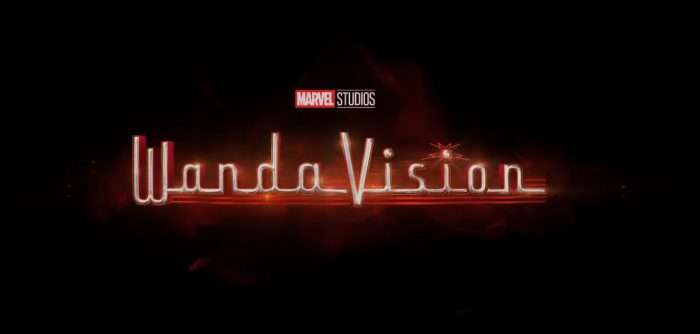NOTE: Some spoilers from throughout, “WandaVision” are present in this review
Now that the Marvel Cinematic Universe has wrapped up its eleven-year, twenty-two movies-long ‘Infinity Saga’ that began with 2008’s Iron Man and spanned all the way to 2019’s Avengers: Endgame, a bold new era has begun for Disney’s and Marvel Studios’ flagship live-action superhero franchise. Not only are a fresh batch of MCU movies with new characters, new story arcs and new conflicts on the way for the indefinite future (well, when the ongoing COVID-19 pandemic stops playing havoc with Disney’s release schedule anyway!), but Disney has also taken full advantage of the premiere for its fresh in-house streaming platform, green-lighting a whole slew of MCU television projects made exclusively for Disney+, both ongoing and miniseries. This catalogue of Disney+ shows will also be overseen directly by Marvel Studios, not the formerly separate Marvel Television, giving them higher production values, along with the ability to spotlight characters and storylines that become pivotal and expanded upon in future MCU movies.
Finally, at long last, the MCU’s television shows will be acknowledged by, and directly tie in with, the events of the MCU’s movies, and vice-versa! This is long overdue, after Marvel Television’s former MCU TV shows (which may or may not still be canon? No one seems to know for sure at this point!), such as Agents of S.H.I.E.L.D., Daredevil, Jessica Jones, or Runaways, among others, have been able to reference events from the MCU’s movies, but have never been acknowledged in turn by the MCU’s mainline movie arm. To further ease audiences into this heightened synergy between the MCU’s movies and Disney+ shows, the first crop of Disney+ series offerings will also center around characters that have already been well-established in several MCU movies, including Hawkeye, Loki, Falcon, Winter Soldier, and, preceding all of them, Wanda Maximoff and formerly fallen android, Vision.
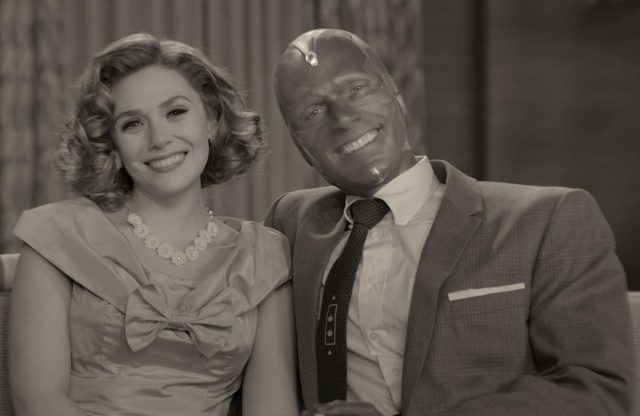
WandaVision serves as a nine-episode miniseries, and the inaugural MCU Disney+ series (this role was originally going to be filled last year by The Falcon & The Winter Soldier, though COVID-19 complications ultimately delayed that miniseries’ premiere to a couple of weeks after WandaVision’s conclusion), one that picks up in the immediate aftermath of Avengers: Endgame. The show pitches a potent mystery right from the jump as well, placing Wanda and Vision in a seemingly idyllic suburban life within Westview, New Jersey, albeit one that seems to unfold in a monochromatic sitcom-esque world, complete with a laugh track. Immediately, viewers will have many questions; Why are Wanda and Vision living in a literal sitcom world? Why does it suddenly appear to be the 1950’s? Also, most confusing of all for longstanding MCU loyalists, didn’t Vision die during Avengers: Infinity War?! Vision wasn’t just snapped away by Thanos, but actively murdered by the Mad Titan, before the fateful ‘Snap’ that would erase half of all life in the universe for five whole years!
This initial mystery gives way to a torrent of other mysteries, all of which leave viewers with more questions upon the conclusion of each episode. Thus, what begins as an innocent, romantic and lovable sitcom, a first for MCU media, quickly starts leaking sinister undertones. Something isn’t right about Wanda’s and Vision’s world, and that quickly becomes apparent right from the first episode. For example, Wanda and Vision can’t remember their lives before Westview, nor any details from their wedding, or even what exactly Vision does at his job! Not only that, but time itself seems warped in the world of Westview, with each successive episode bringing Wanda’s and Vision’s world into a new decade of history, and with it, a new decade of sitcom tropes. All the while, other bizarre events occur, from spontaneous pregnancies to overnight reinventions for the Maximoff/Vision family home, suggesting that Wanda and Vision are somehow being manipulated in ways that they can’t explain.
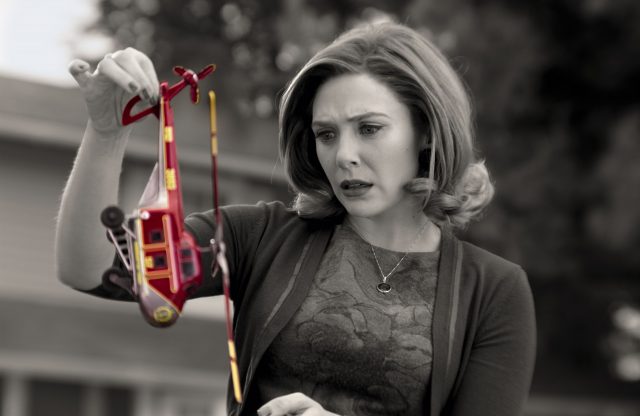
This is a very ambitious pitch for the first MCU television series made for Disney+, not only because it presents the MCU’s first true comedy, but also because it’s a comedy that gradually unravels into a surprisingly dark psychological thriller by its conclusion! The true secrets behind Westview run deep, and this makes theorizing, investigating and exploring WandaVision into a kooky delight, especially while it was doling out its weekly episode premieres. The experience is even better for big family sitcom enthusiasts as well, who will find decades’ worth of sitcom homages and Easter eggs throughout most of WandaVision’s episodes, between the black-and-white retro charm of Bewitched and The Dick Van Dyke Show, to the lovable, more mature domestic growing pains of Family Ties and Malcolm in the Middle, to the mockumentary-style cutaway gags of Modern Family, depending on the episode.
Not only is WandaVision’s comedy surprisingly rich and funny as well, but it often blends surprisingly effectively with the dark underlying themes of grief and mental illness that are at play throughout Wanda’s story arc in particular. Obviously, the fact that Vision died during the events of Avengers: Infinity War plays a significant part in the show’s events, especially when Wanda is finally allowed to live what appears to be the perfect life, complete with eventually giving birth to twin boys, Billy and Tommy, each of whom appear to possess the respective powers of Wanda and her brother, Pietro. Speaking of Pietro, a.k.a. Quicksilver, who was also killed off in the MCU, specifically during the climax of 2015’s Avengers: Age of Ultron, he also resurfaces on WandaVision, though now the character is played by Evan Peters, who, ironically enough, portrayed the role of Quicksilver in 20th Century Studios’ former X-Men movie franchise!
The sudden reappearance of a different Quicksilver in the MCU serves as the latest in a series of hints that Marvel Studios’ cinematic world is about to embrace the Marvel Multiverse, possibly priming the MCU to interact with other Marvel movie universes in the near future, from 20th Century Studios’ X-Men franchise to Sony Pictures’ standalone Spider-Man movies, or perhaps even New Line Cinema’s Blade movies, among other potential examples! Those hoping for WandaVision to go all out on its inter-dimensional MCU implications however may be disappointed, especially when WandaVision is openly meant to serve as a multi-episode prequel to an upcoming MCU movie sequel, next year’s Doctor Strange in the Multiverse of Madness. After all, there’s no sense having WandaVision blow its entire multiverse load all at once, which would leave the good Doctor with nothing to work with during his next big screen offering.
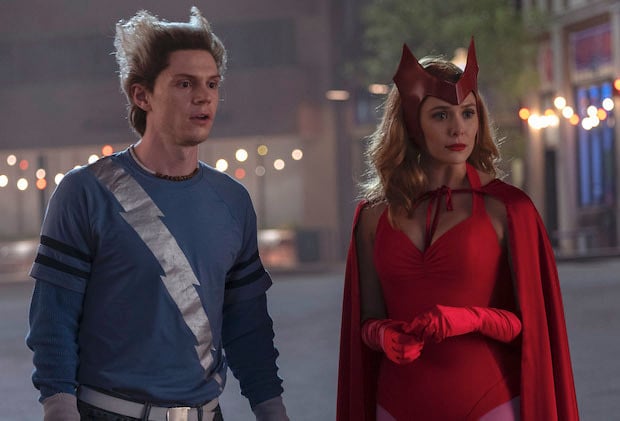
Even so, there are some ultimate resolutions in WandaVision that do simply fall flat, without want of preserving future MCU stories. The truth behind events like Pietro returning to life, complete with the face of a multiverse counterpart from the standalone X-Men movies, along with how and why Westview came to be entrenched in a sitcom reality, are sometimes disappointingly boilerplate and unfulfilling, especially for longtime Marvel fans that would be conditioned to expect more eldritch intervention in the show. Likewise, the involvement of S.W.O.R.D., the ‘Sentient Weapon Observation and Response Division’, a covert U.S. government agency that seems to be serving as the full-time successor to the fallen S.H.I.E.L.D. in the MCU at this point, can sometimes work to mixed effect. S.W.O.R.D. is often used as the exposition dump behind WandaVision’s conflicts, along with its link to the MCU’s true reality. At its best, this can help keep viewers grounded in terms of Wanda’s and Vision’s false sitcom reality, and help audiences understand its potential effects on the wider MCU. At its worst though, S.W.O.R.D.’s info dumps can grind the pacing of the show to a screeching halt, especially when its crooked director, a key catalyst behind events in Westview, is ultimately brought down in a frustratingly anti-climactic fashion during the series finale.
What manages to preserve WandaVision’s charm even during its weaker twists and slower stretches however is its core cast, which is universally fantastic! Elizabeth Olsen in particular is finally allowed to really dive into the traumatized, challenged psychology of Wanda throughout WandaVision, ostensibly one of the most powerful heroes in the MCU, putting her in an overdue leading role that sees her dark history come to a shocking head in Westview. Meanwhile, Paul Bettany has a great time breaking away from type, playing a more light-hearted, oblivious husband to Wanda here, one that often steals the humour during WandaVision’s early episodes in particular. As much as viewers will immediately suspect that not all is as it seems between Wanda and Vision during their life in Westview, it’s impossible to deny how quaint and lovable these two characters feel as a couple, even while the show explores the fractured psychology lingering under the surface of its seemingly perfect reality.
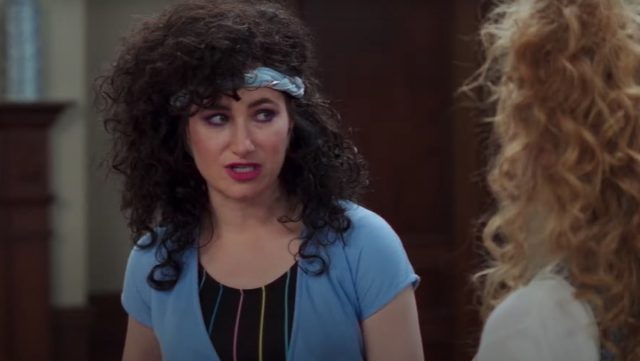
WandaVision’s supporting cast is likewise full of standout performances! Randall Park and Kat Dennings make the S.W.O.R.D. scenes a frequent delight, reprising their roles as Ant-Man and the Wasp’s FBI agent, Jimmy Woo and Thor’s snarky research assistant, Darcy Lewis, respectively, bringing WandaVision’s kooky sense of humour outside of Westview whenever necessary. Teyonah Parris also makes a strong first impression as the grown-up Monica Rambeau, the daughter of S.W.O.R.D. founder and Captain Marvel’s best buddy, Maria Rambeau, who finds herself set on a surprising path in the post-Snap world, one that will inevitably lend itself to no shortage of future MCU projects. Easily the biggest standout among WandaVision’s supporting cast however is Kathryn Hahn as Wanda’s and Vision’s nosy neighbour, Agnes, a truly hilarious, highly charming character that nonetheless perfectly ends up personifying the darker side of Westview, carrying her own astonishing secrets that ultimately force the show’s protagonists to confront a bleak truth about the fallout from their battles against Ultron and Thanos.
As much as I warned about potential spoilers at the top of this review, I’m nonetheless trying my hardest to avoid spilling the beans on WandaVision’s biggest and best surprises, in case you still haven’t watched the series. Believe me when I say that the experience behind WandaVision benefits highly from viewers not knowing what to expect going in. Somehow, this show manages to balance a sharp, lovable sense of humour with surprisingly unrelenting psychological drama, and even a little bit of horror in that respect, but what’s most impressive about the series’ writing is that its heart-wrenching conclusion doesn’t pull punches! Even if not every twist feels rewarding, the ultimate conclusion of Wanda’s latest MCU journey paints a surprisingly challenging, richly foreboding picture of where one of the MCU’s most powerful anti-heroes appears to be headed next, and it could spell big trouble for the universe all over again! Obviously, this will inevitably leave MCU enthusiasts more excited than ever to see Doctor Strange in the Multiverse of Madness next year, which will finally unveil the horrific metaphysical consequences that events in Westview appear to be barreling towards.
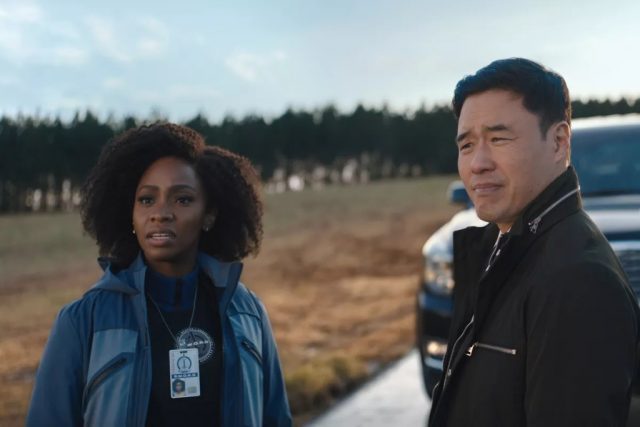
Even divorced from its wider implications on the MCU at large however, WandaVision still mostly succeeds as an entertaining, thought-provoking and surprisingly funny exploration of many timely themes, from examining grief, to the evolving role of women in a domestic setting, to the potentially unhealthy standards presented to us by the media, among other things. The show isn’t always perfect, but it is very smart and very ambitious, ultimately succeeding at achieving most of its loftiest thematic goals as well. Best of all, WandaVision also beautifully illustrates the immense creative potential behind the MCU’s upcoming Disney+ series catalogue, which aims to spotlight characters that don’t quite have the pedigree to headline a blockbuster movie, but nonetheless carry their own rich storytelling potential that effectively lends itself to the kind of bizarre, subversive, creatively rewarding concept that a movie wouldn’t really be able to utilize in its proper depth. It’s a win-win for the MCU, and for Disney and Marvel Studios overall, taking an already fantastic shared universe of movies, and giving it even more creative flexibility on television!
WandaVision may be a one-and-done miniseries, but it’s only the first in a whole wave of Disney+ shows that will continue to push the creative and thematic boundaries of the MCU, in ways that wouldn’t previously have been possible. Even after concluding eleven years of buildup, and taking an entire year off in 2020 due to COVID-19 complications, Marvel Studios somehow hasn’t lost any momentum, with WandaVision kicking off their bold new era of ‘Phase Four’ MCU content with the ironclad assurance that they’re still the heavyweight champions of superhero storytelling!

